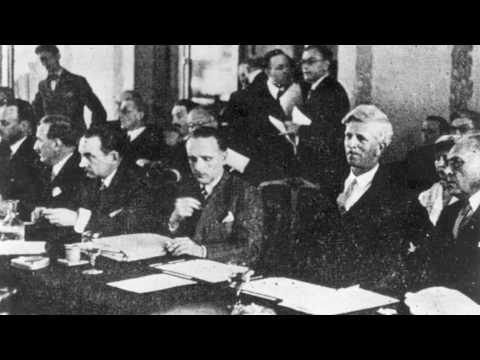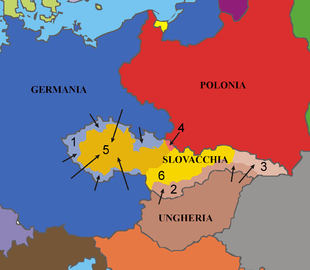PRISONER OF STALIN AND OF HITLER
Margarete Buber Neumann (Potsdam, 21 October 1901 -
Frankfurt am Main, 6 November 1989) was a German writer and journalist.
Communist activist, she was imprisoned both in a gulag and in a lager.
Fist Part
THE APPEASEMENT POLICY
THE APPEASEMENT POLICY
,“My dear friends, this is the second time
we have returned from Germany to Downing Street with an honorable peace.
I believe it is a peace for our age. We thank you from the bottom of our hearts.
Now I recommend you go home and sleep peacefully in your beds.”
Arthur Neville Chamberlain
Chamberlain when he returned after the signing of the Monaco agreements,
solemnly announcing to the country to bring "peace for our age".
solemnly announcing to the country to bring "peace for our age".
Winston Churchill himself, commented with great predictive ability,
on the behavior of Western leaders with these words:
"They could choose between dishonor and war.
They chose dishonor and they will have war".
on the behavior of Western leaders with these words:
"They could choose between dishonor and war.
They chose dishonor and they will have war".
Churchill was overwhelmed by the whistling, in the House of Commons,while he said
that France and England had suffered a "total defeat and without excuse",
foreseeing that that would have been only the beginning of Hitler's claims,
whose expansionist hunger, also thanks to the evident post-Munich reinforcement,
certainly not satisfied with the Sudetenland.
that France and England had suffered a "total defeat and without excuse",
foreseeing that that would have been only the beginning of Hitler's claims,
whose expansionist hunger, also thanks to the evident post-Munich reinforcement,
certainly not satisfied with the Sudetenland.
While Adolf Hitler took advantage of the divisions on the left where the communists refused to cooperate with the social democrats and on the vanity of some long-standing politicians like Franz Von Papen,in 1933 he became chancellor and in 1934 dictator,
with the title of Führer, of Germany from 1934 to 1945.
Taking advantage of the economic crisis and the discontent of the defeat of the First World War, a policy of strong rearmament and a call to a vital space began, Lebensraum.
In France, the politics of Prime Minister Édouard Daladier was even more pliant than that of Chamberlain: France still had to recover from the wounds of the First World War and how the Great Bretannia did not modernize its army
| Édouard Daladier |
.
Marc Bloch: "The strange defeat"
testimony of 1940
Silvio Lanaro, Italian historian, writes in the introduction to the book.
"In broad terms, Bloc's thesis is fairly well known:
reasons for an ignominious defeat must essentially be traced to the inability to command
in the disintegration of French society, of which the gerontocracy,
the method of co-optation, the lack of a sense of responsibility,
are epiphenomena corporate closures, amateurism and improvisation of connections,
the slowness of information, the obtuseness of officers, the culture of a barracks,
the laziness of administrative officials, the defeatism of the bourgeoisie and the proletariat,
the cowardice of those who immediately find it natural to be beaten ."
reasons for an ignominious defeat must essentially be traced to the inability to command
in the disintegration of French society, of which the gerontocracy,
the method of co-optation, the lack of a sense of responsibility,
are epiphenomena corporate closures, amateurism and improvisation of connections,
the slowness of information, the obtuseness of officers, the culture of a barracks,
the laziness of administrative officials, the defeatism of the bourgeoisie and the proletariat,
the cowardice of those who immediately find it natural to be beaten ."
1938 is a watershed year that will decide the fate of a continent.
In 1938 two conferences were held:The Shame Conference,
in the Swiss spa town of Evian on the Lèc Lèman (Lake Geneva),
promoted by the Society for Nations (there were 32 delegations, 9 European,
20 from Latin America and three from the Commonwealth countries)
to find a solution to German and Jewish refugees.
in the Swiss spa town of Evian on the Lèc Lèman (Lake Geneva),
promoted by the Society for Nations (there were 32 delegations, 9 European,
20 from Latin America and three from the Commonwealth countries)
to find a solution to German and Jewish refugees.
The non-expressed conference an official condemnation of Germany,
for the treatment of Jews was largely exploited by Nazi propaganda.
for the treatment of Jews was largely exploited by Nazi propaganda.
Only the delegation of the Dominican Republic was willing to accept 100,000 refugees.
The delegates openly expressed their sympathy for the refugees.
The Australian delegate ruled:
"not having racial problems, we certainly don't want to import them".
"not having racial problems, we certainly don't want to import them".
German Jews became stateless refugees as early as 1935,
thanks to the Nuremberg laws.
thanks to the Nuremberg laws.
With the Anschluss,
the annexation of Austria to Germany to form the "Great Germany" in 1938,
to the 500,000 German Jews (150,000 had already left but could not reach Palestine,
for the quotas imposed by the British), we add the 200,000 Austrian Jews
(also in Austria 50,000 Jews left their homeland).
the annexation of Austria to Germany to form the "Great Germany" in 1938,
to the 500,000 German Jews (150,000 had already left but could not reach Palestine,
for the quotas imposed by the British), we add the 200,000 Austrian Jews
(also in Austria 50,000 Jews left their homeland).
In the second Munich Conference and agreement,
which was held from 29 to 30 September 1938, among the heads of government:
the British premier of the United Kingdom, France, Germany and Italy, .
which was held from 29 to 30 September 1938, among the heads of government:
the British premier of the United Kingdom, France, Germany and Italy, .
Even Russia was not invited despite being an ally of France and Czechoslovakia,
that was at the center of the conference debate on the Sudeten issue.
This changed Russia's attitude towards Western countries,
as well as reconsidering the position towards Nazi Germany..
that was at the center of the conference debate on the Sudeten issue.
This changed Russia's attitude towards Western countries,
as well as reconsidering the position towards Nazi Germany..
The foundations of the Molotov-von Ribbentrop pact were laid,
which allowed Germany to not divide its forces on two fronts,
at the time of the outbreak of World War II.
On September 29, Mussolini presented his mediation (actually Hitler's proposal),
that the allies were happy to indulge, in exchange for false assurances.
The annexation of the Sudetes to the Third Reich,
greeted by scenes of jubilation in the region, was bloodless:
the Czechoslovakians, informed by the Allies, that in case of war,
they should have fought alone against Germany,
had to suffer the humiliating clauses of the Munich agreements,
on which they had not even been consulted.
The British premier, celebrated as "The Good Old Neville",
also exhibited a ridiculous additional protocol,
that he had signed to Hitler, which foresaw that Germany and England,
would use the method of consultations to smooth out
their possible future differences in order to maintain the peace in Europe.
____red German border
........ red eastern border of the demilitarized zone
in white Germany in 1935
in light brown expansion of Germany from 1935 to 1938
in brown Saar Territory
The Germans also occupied the Czech regions of Bohemia and Moravia,
where ethnic Germanic populations were only a minority,
turning them into their protectorate, and made Slovakia,
a satellite state of the Third Reich under the guidance of the collaborationist priest Jozef Tiso.
where ethnic Germanic populations were only a minority,
turning them into their protectorate, and made Slovakia,
a satellite state of the Third Reich under the guidance of the collaborationist priest Jozef Tiso.
vignette of the evening star"And isn't there a chair for me?"
Stalin asks the four leaders of Monaco in this cartoon by Low,
which appeared in the "Evening Standard".
Stalin asks the four leaders of Monaco in this cartoon by Low,
which appeared in the "Evening Standard".
The Russian Empire entered the war from the beginning of the First World War. The collapse of the Russian home front in 1917 due to the hardships suffered by civilians and the repeated military defeats led to the February Revolution, which led to the abdication of the Tsar and the establishment of a temporary regime, chaired by Georgij Evgen'evič L'vov. The return of Vladimir Lenin from Switzerland (thanks to the help of the Germans) earned the Bolshevik rebels the agitation of part of the population that led eight months later to the October Revolution. The new Bolshevik government, of anti-war ideals and aware of destruction caused by the war to Russia, opted to sign a separate peace with the Central Powers, consenting to heavy enemy demands (Germany in particular aimed to control Ukraine, rich in cultivated fields, to refresh its troops). This led to the Brest-Litovsk Treaty, where the new Russian government was represented by Lev Trockij.
 |
| Brest-Litovsk Treaty |
https://en.wikipedia.org/wiki/Treaty_of_Brest-Litovsk

Commenti
Posta un commento